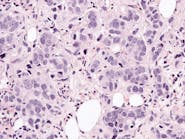Researchers from Children’s Hospital of Philadelphia (CHOP), the Alex’s Lemonade Stand Foundation Childhood Cancer Data Lab, the Children’s Brain Tumor Network (CBTN), the Pacific Pediatric Neuro-Oncology Consortium (PNOC), and more than 20 additional institutions have partnered an open-source, reproducible analysis platform for pediatric brain tumors.
With the help of thousands of genomically sequenced samples, researchers have used this platform to identify initial findings about genetic variants associated with poorer outcomes that could help guide future diagnostic and therapeutic advances.
The details of the platform and those initial findings were published online today by the journal Cell Genomics.
In 2011, CBTN and PNOC began extracting and preparing what has now become nearly 6,000 tumor samples with over 68,000 sub-samples. More than 1,000 of these tumors were sequenced to form the initial release of the Pediatric Brain Tumor Atlas (PTBA) in 2018, and data were made available without embargo so that researchers could study what variants might be driving certain types of brain tumors. With the help of the Alex’s Lemonade Stand Foundation Childhood Cancer Data Lab, the team of researchers was able to build an open-source version of this atlas, the Open Pediatric Brain Tumor Atlas (OpenPBTA), to analyze these data.
OpenPBTA is accessible to anyone conducting research who is looking for new therapeutic targets or finding new ways to translate research into clinical practice. At the time of this study, OpenPBTA contained genomic and clinical data from more than 1,000 pediatric brain tumors and 22 patient-derived cell lines from the CBTN and PNOC. The OpenPBTA provides an open, real-time framework to genomically characterize pediatric brain tumors. It is the first large-scale, collaborative, open analysis of genomic data and provides a cloud-based resource for researchers looking for more comprehensive data on pediatric brain tumors.
OpenPBTA is already providing researchers with more insight into potential drivers of pediatric brain tumors. In this study, researchers found that the loss of the tumor suppressor gene TP53 is a significant marker for poor overall survival in fast-growing brain and spinal cord tumors called ependymomas and certain diffuse midline gliomas, and dysregulation of the gene was also implicated in hypermutant high-grade gliomas.





